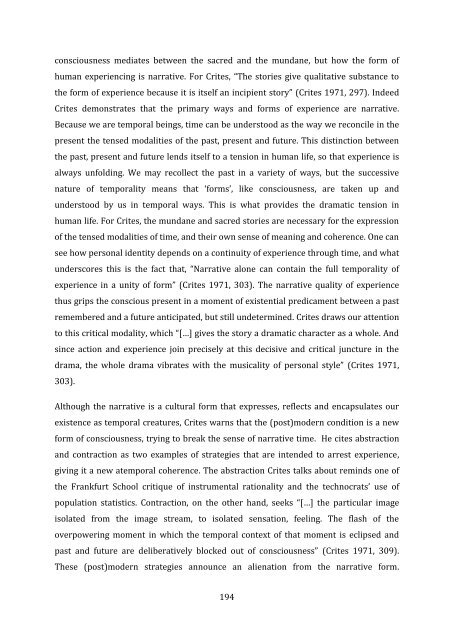Philip Y. Kao PhD thesis - Research@StAndrews:FullText
Philip Y. Kao PhD thesis - Research@StAndrews:FullText
Philip Y. Kao PhD thesis - Research@StAndrews:FullText
You also want an ePaper? Increase the reach of your titles
YUMPU automatically turns print PDFs into web optimized ePapers that Google loves.
consciousness mediates between the sacred and the mundane, but how the form of<br />
human experiencing is narrative. For Crites, “The stories give qualitative substance to<br />
the form of experience because it is itself an incipient story” (Crites 1971, 297). Indeed<br />
Crites demonstrates that the primary ways and forms of experience are narrative.<br />
Because we are temporal beings, time can be understood as the way we reconcile in the<br />
present the tensed modalities of the past, present and future. This distinction between<br />
the past, present and future lends itself to a tension in human life, so that experience is<br />
always unfolding. We may recollect the past in a variety of ways, but the successive<br />
nature of temporality means that ‘forms’, like consciousness, are taken up and<br />
understood by us in temporal ways. This is what provides the dramatic tension in<br />
human life. For Crites, the mundane and sacred stories are necessary for the expression<br />
of the tensed modalities of time, and their own sense of meaning and coherence. One can<br />
see how personal identity depends on a continuity of experience through time, and what<br />
underscores this is the fact that, “Narrative alone can contain the full temporality of<br />
experience in a unity of form” (Crites 1971, 303). The narrative quality of experience<br />
thus grips the conscious present in a moment of existential predicament between a past<br />
remembered and a future anticipated, but still undetermined. Crites draws our attention<br />
to this critical modality, which “[…] gives the story a dramatic character as a whole. And<br />
since action and experience join precisely at this decisive and critical juncture in the<br />
drama, the whole drama vibrates with the musicality of personal style” (Crites 1971,<br />
303).<br />
Although the narrative is a cultural form that expresses, reflects and encapsulates our<br />
existence as temporal creatures, Crites warns that the (post)modern condition is a new<br />
form of consciousness, trying to break the sense of narrative time. He cites abstraction<br />
and contraction as two examples of strategies that are intended to arrest experience,<br />
giving it a new atemporal coherence. The abstraction Crites talks about reminds one of<br />
the Frankfurt School critique of instrumental rationality and the technocrats’ use of<br />
population statistics. Contraction, on the other hand, seeks “[…] the particular image<br />
isolated from the image stream, to isolated sensation, feeling. The flash of the<br />
overpowering moment in which the temporal context of that moment is eclipsed and<br />
past and future are deliberatively blocked out of consciousness” (Crites 1971, 309).<br />
These (post)modern strategies announce an alienation from the narrative form.<br />
194
















